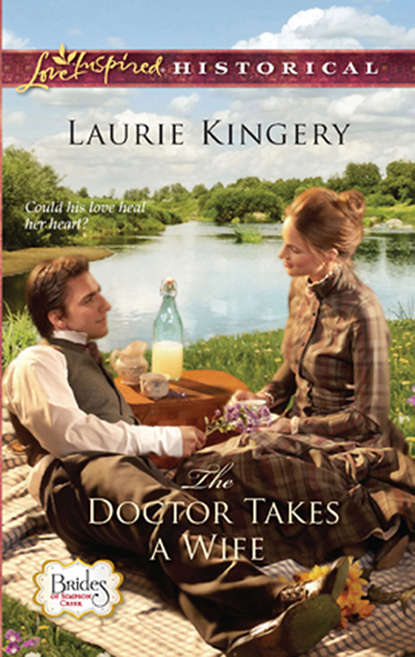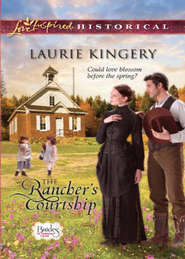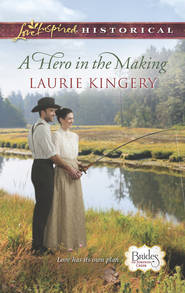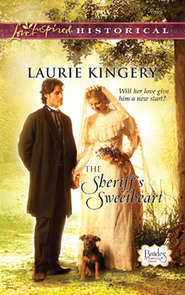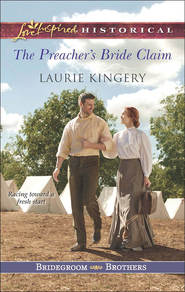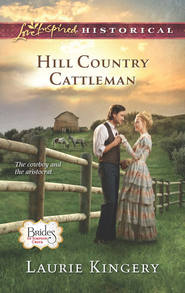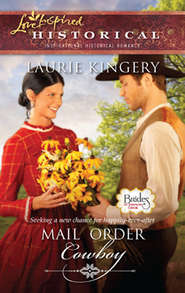По всем вопросам обращайтесь на: info@litportal.ru
(©) 2003-2025.
✖
The Doctor Takes a Wife
Настройки чтения
Размер шрифта
Высота строк
Поля
It was the coldest day he’d experienced since coming to Texas, but it was still nothing to what the weather would be like in his home state at this time of year. Back in Maine, there might well be a foot of snow on the ground and a bitter wind blowing. Folks would be swathed in heavy coats, hats, boots and knitted scarves. Perhaps he’d miss seeing snow eventually, but right now he savored the warmth of the sun on his face.
Then he felt Sarah shiver.
“Are you cold?” he asked.
“No, I—I’m fine.”
Nolan whipped off his frock coat again anyway and settled it around her shoulders over her shawl. She had sand, he thought—real courage and grit. She hadn’t given in to her faintness when many ladies would have, but he had to remember she’d just had a traumatic experience and had lost some blood.
Sarah blinked at the gesture, and a little color crept into her cheeks. “Th-thank you.”
They said nothing more during the short walk to his office. He ushered her inside, seating her in his exam chair which had a flat surface extending over each arm. He was thankful he’d had sense enough to clean and boil his suturing instruments last night, even though the hour had been late—after he’d finished taking care of a cowboy who’d been cut by flying glass in a ruckus at the saloon. The instruments lay on a metal stand, concealed by a fresh cloth, but he wouldn’t bring them out yet.
“I’ll be right back. I’m going to put a pot of water on for coffee when we’re finished,” he said, deliberately not giving her the chance to demur before he walked down the hallway that led to his living quarters. She’d need something hot and bracing when he was done.
Returning, he stepped over to a basin, poured a pitcher of water into it and began to scrub his hands and forearms with a bar of soap, remembering all the times the other field surgeons had made sport of him for what they called his “old maid fussiness” when he was preparing to operate. “I can amputate twice as many legs and arms as you can in half the time, Walker,” one of them had boasted. “And I don’t use gallons of carbolic, either.” News of the use of carbolic acid’s role in preventing infection had come from Europe in the last year of the war, but only a few doctors in America believed in it.
“Yes, and you lose most of them to infection days later,” he’d retorted, “while most of mine live to re cover. So I still come out ahead.”
He felt her curious gaze on him, watching as he scrubbed up and down, the harsh lye soap stinging his skin. Then he poured diluted carbolic acid over his hands. When he looked back while he was drying his hands on a clean towel, though, he found her staring at his open rolltop desk. He’d been looking at a small framed daguerreotype he normally left hidden in a drawer, and when he decided to stroll over to the mercantile, he’d absentmindedly left it out on the desk.
“That’s my wife and son,” he said, when he could find his breath. “They died the summer before the war began.”
Her eyes widened and grew sad. “Oh, I’m sorry,” she said quickly, then seemed to hesitate, and he knew she was trying a polite way to ask the question.
“Cholera,” he said, sparing her the need.
“Oh…how terrible,” she murmured. “You had no other children?”
He shook his head, firmly suppressing the old pain within him. “No. Now you’re going to have to be brave,” he said, knowing his words would distract her from further questions. He brought the bottle of diluted carbolic acid and a basin to the armrest. Pulling a stool over, he sat, then carefully unwrapped the bandage around her arm. He held her arm over the basin, and caught her gaze.
“This is going to sting,” he warned. “You want a bullet to bite?”
He’d hoped his little attempt at humor would make her smile, at least for a moment. but she only shook her head and looked away, putting her other hand to her mouth.
“Go ahead,” she whispered.
He poured the carbolic acid over the wound, wincing inwardly as she gasped and clamped her free hand over her mouth.
“Sorry. I don’t want you to get blood poisoning or lockjaw from that rusty nail.”
After removing the basin, he rolled over the tray of instruments on its stand and unscrewed his jar of boiled catgut suture in alcohol, pulled out a couple lengths and laid them on the stand among his instruments. Then picking up a suture needle, he threaded it.
“This is going to hurt, too, I’m afraid, though not as much as that carbolic.”
“Do what you have to do,” she said, tight-lipped, her face as white as the unbloodstained part of her bodice.
He bent his head to his task. She couldn’t know how much harder this was for him than it had been to suture a soldier’s cuts, knowing his touch was inflicting more pain on the very woman he cared about so much. He had to steel himself to ignore her wince each time he inserted the needle into her flesh. Thanks to his experience in battlefield surgery, he was able to close this relatively uncomplicated wound quickly. When he was finished, he looked at his patient.
Her head lay back against the headrest of the chair, her eyes were closed. Pearls of sweat beaded her pale skin.
“I’m done,” he said, wondering if he ought to get out the vial of hartshorn he kept in his desk for swooning ladies. “You were very brave, Miss Matthews.”
She opened her eyes and smiled wanly at him. “Thank you.”
He saw her dart a glance at the neatly sutured wound before she raised her gaze back to his face.
“This may scar a little,” he said, “but not as much as if we’d just bandaged it. And you’re going to have to watch it for infection. Any red streaks or swelling or drainage, you come back to see me immediately. I’m going to rebandage it,” he said, and took up a roll of linen, which he circled around her forearm and tied by the ends as he had at the store. “Now I’ll get that coffee I promised you.”
“Oh, but you needn’t bother—” she began, but he cut her off.
“No bother, I want some, and I need to see a little more color in those cheeks before I let you out of that chair. If I let you get up now, you’ll collapse like a wilted lily.” Wishing he could invite her back to his kitchen but knowing it would seem improper to her, he left without waiting to hear any further protests.
He returned a moment later, carrying two sturdy crockery mugs full of steaming coffee.
“I took the liberty of putting sugar in yours,” he said. “I didn’t know if you take it that way, but you need the sugar for energy right now.” Then, a little less certainly, he said, “It’s probably a little strong for you. I could get some water—”
“No, it’s fine,” she assured him. “Josh, our foreman, always says it isn’t ranch coffee unless it’s so strong the spoon stands up in the cup.” She took a tentative sip, then another deeper one before he spoke again.
“Is this a good time to have that talk?”
“T-talk? What talk?” Sarah stammered. She should have known he would take advantage of being alone with her like this to claim the fulfillment of her promise. She could hardly refuse to talk to him, now that he’d played the Good Samaritan and taken care of her wound.
His expression told her that he knew she’d been playing for time to think, that she knew exactly what talk he meant. “The talk you promised me at the wedding, even said you’d look forward to, and have avoided ever since. The talk in which you’re going to explain why you don’t like me.”
“I haven’t avoided you,” she protested. “I’ve been very busy at the ranch, what with Milly being off on her honeymoon and all. I haven’t come into town except to deliver my pies and cakes, go to church and attend a meeting of the Spinsters’ Club.”
He raised an eyebrow as if to imply that if she could do all that, she could have made time to talk to him. “So why don’t you? Like me, that is. You seemed to like me well enough when we were corresponding, but as soon as you set eyes on me, you no longer did.”
Sarah sighed. She was trapped and there was no getting around it. She’d promised to do this and she had to honor her word. She owed him her honesty, at least—but now that it came down to it, and especially after what he’d done for her today, she didn’t feel as righteous about her dislike as she had before. Or as certain.
“Perhaps you find me a homely fellow, not much to look at,” he ventured, but there was a twinkle in his eye.
She met his gaze head on. “Dr. Walker—”
“Nolan,” he corrected her. “We’re not speaking as doctor and patient now.”
“I’m sure you have some sort of a mirror,” Sarah said, “so you know very well you’re not ugly.” Quite the contrary, she thought, looking into his deep blue eyes and studying his strong, rugged features. She took a deep breath. “All right, but remember you asked to hear this. I didn’t like you because you’re a Yankee.”
Understanding dawned in his eyes. “So you thought well enough of me until I spoke to you.”
“Yes, and that’s your fault. You never said you were a Yankee. By writing to me from Brazos County, you allowed me to believe you a Texan.”
“So you dislike me strictly because I come from the North,” he stated. “Doesn’t that sound rather arbitrary on your part, seeing as the war’s over? As I mentioned, it hasn’t prevented the rest of the townsfolk from accepting me. Why is it so important to you?”
Sarah sighed again, steeling herself to the pain of talking about Jesse. “I was engaged to a wonderful man before the war began,” she said. “Jesse Holt. He…he died in the war—at least, I have to assume that, since he never came back. The men who did come back said…” She looked down as she struggled to finish. “Sometimes when men were killed, they…they…couldn’t be identified.”
Nolan’s eyes, when she looked up, were unfocused, haunted, as if he was remembering that and worse.





